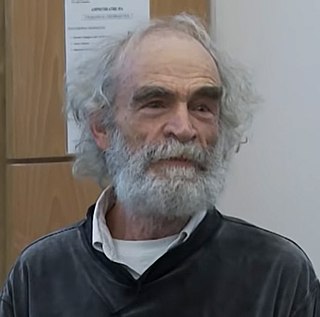A Quote by James Joseph Sylvester
If I were asked to name, in one word, the pole star round which the mathematical firmament revolves, the central idea which pervades the whole corpus of mathematical doctrine, I should point to Continuity as contained in our notions of space, and say, it is this, it is this!
Related Quotes
If the system exhibits a structure which can be represented by a mathematical equivalent, called a mathematical model, and if the objective can be also so quantified, then some computational method may be evolved for choosing the best schedule of actions among alternatives. Such use of mathematical models is termed mathematical programming.
The mathematical is that evident aspect of things within which we are always already moving and according to which we experience them as things at all, and as such things. The mathematical is this fundamental position we take toward things by which we take up things as already given to us, and as they must and should be given. Therefore, the mathematical is the fundamental presupposition of the knowledge of things.
Mathematics is a logical method. . . . Mathematical propositions express no thoughts. In life it is never a mathematical proposition which we need, but we use mathematical propositions only in order to infer from propositions which do not belong to mathematics to others which equally do not belong to mathematics.
Whereas I think: I’m lying here in a haystack... The tiny space I occupy is so infinitesimal in comparison with the rest of space, which I don’t occupy and which has no relation to me. And the period of time in which I’m fated to live is so insignificant beside the eternity in which I haven’t existed and won’t exist... And yet in this atom, this mathematical point, blood is circulating, a brain is working, desiring something... What chaos! What a farce!
The constructs of the mathematical mind are at the same time free and necessary. The individual mathematician feels free to define his notions and set up his axioms as he pleases. But the question is will he get his fellow mathematician interested in the constructs of his imagination. We cannot help the feeling that certain mathematical structures which have evolved through the combined efforts of the mathematical community bear the stamp of a necessity not affected by the accidents of their historical birth.
This common and unfortunate fact of the lack of adequate presentation of basic ideas and motivations of almost any mathematical theory is probably due to the binary nature of mathematical perception. Either you have no inkling of an idea, or, once you have understood it, the very idea appears so embarrassingly obvious that you feel reluctant to say it aloud.
The Reader may here observe the Force of Numbers, which can be successfully applied, even to those things, which one would imagine are subject to no Rules. There are very few things which we know, which are not capable of being reduc'd to a Mathematical Reasoning, and when they cannot, it's a sign our Knowledge of them is very small and confus'd; and where a mathematical reasoning can be had, it's as great folly to make use of any other, as to grope for a thing in the dark when you have a Candle standing by you.
I imagine that whenever the mind perceives a mathematical idea, it makes contact with Plato's world of mathematical concepts... When mathematicians communicate, this is made possible by each one having a direct route to truth, the consciousness of each being in a position to perceive mathematical truths directly, through the process of 'seeing'.
We humans have a wide range of abilities that help us perceive and analyze mathematical content. We perceive abstract notions not just through seeing but also by hearing, by feeling, by our sense of body motion and position. Our geometric and spatial skills are highly trainable, just as in other high-performance activities. In mathematics we can use the modules of our minds in flexible ways - even metaphorically. A whole-mind approach to mathematical thinking is vastly more effective than the common approach that manipulates only symbols.
Those who assert that the mathematical sciences say nothing of the beautiful or the good are in error. For these sciences say and prove a great deal about them; if they do not expressly mention them, but prove attributes which are their results or definitions, it is not true that they tell us nothing about them. The chief forms of beauty are order and symmetry and definiteness, which the mathematical sciences demonstrate in a special degree.
[Before the time of Benjamin Peirce it never occurred to anyone that mathematical research] was one of the things for which a mathematical department existed. Today it is a commonplace in all the leading universities. Peirce stood alone-a mountain peak whose absolute height might be hard to measure, but which towered above all the surrounding country.
Every attempt to employ mathematical methods in the study of chemical questions must be considered profoundly irrational and contrary to the spirit of chemistry.... if mathematical analysis should ever hold a prominent place in chemistry -- an aberration which is happily almost impossible -- it would occasion a rapid and widespread degeneration of that science.
What seems certain is that Pythagoras developed the idea of mathematical logic. He realized that numbers exist independently of the tangible world and therefore their study was untainted by inaccuracies of perception. This meant he could discover truths which were independent of opinion of prejudice and which were more absolute than any previous knowledge.






































